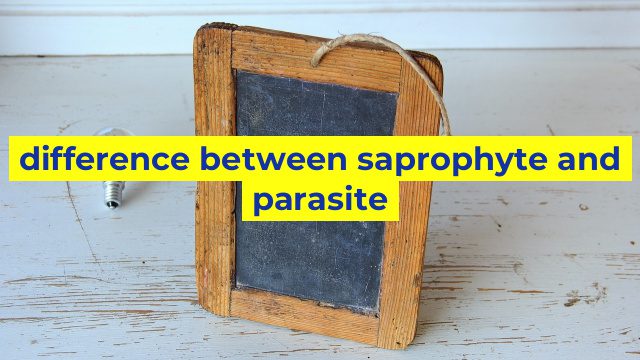Distinguishing Between Saprophytes and Parasites: What You Need to Know
Saprophytes and parasites are two types of organisms that exhibit very different relationships with the rest of the world. Understanding the differences between them is key to understanding how they function, how they interact with other organisms, and how we can control them.
What Are Saprophytes?
Saprophytes are organisms that feed on dead or decaying organic matter. They play an essential role in breaking down dead plant and animal material and recycling nutrients back into the soil. Saprophytes can be found in a wide variety of environments, from forests and fields to compost piles and even inside our own bodies.
Examples of saprophytes include fungi, certain bacteria, and some insects. They are typically harmless to other organisms, and many are even beneficial to the environment by helping to maintain healthy ecosystems.
What Are Parasites?
Parasites, on the other hand, are organisms that live off of other living beings. They can cause harm to their hosts in order to feed or reproduce, and they generally do not contribute to the health of the broader ecosystem.
There are many types of parasites, including viruses, bacteria, fungi, and animals like ticks and tapeworms. Some parasites are more harmful than others; for example, some can cause serious diseases in their hosts, while others may just cause minor inconveniences like itching or irritation.
The Differences Between Saprophytes and Parasites
While both saprophytes and parasites feed on organic matter, they have very different relationships with their hosts. Saprophytes depend on dead or decaying matter, while parasites rely on living organisms. Additionally, saprophytes generally do not cause harm to other organisms and may even be beneficial, while parasites can cause serious health problems in their hosts.
Another key difference between saprophytes and parasites is their impact on the broader ecosystem. Saprophytes play a critical role in breaking down organic matter and recycling nutrients, helping to maintain healthy soils and ecosystems. Parasites, meanwhile, can disrupt ecosystems by causing harm to their hosts and altering their behavior or survival rates.
The Bottom Line
Saprophytes and parasites may both feed on organic matter, but they have very different relationships with the living world. Understanding these differences is important for controlling and managing these organisms, as well as for maintaining healthy ecosystems. By knowing the key characteristics of each type of organism, we can better understand their impact on the world around us and take steps to protect ourselves and our environment.
Table difference between saprophyte and parasite
| Saprophyte | Parasite |
|---|---|
| Organism that feeds on dead or decaying matter | Organism that feeds on a living host and harms it |
| Does not harm the host organism | Harms the host organism |
| Examples include mushrooms, bacteria, and fungi | Examples include tapeworms, ticks, and lice |

